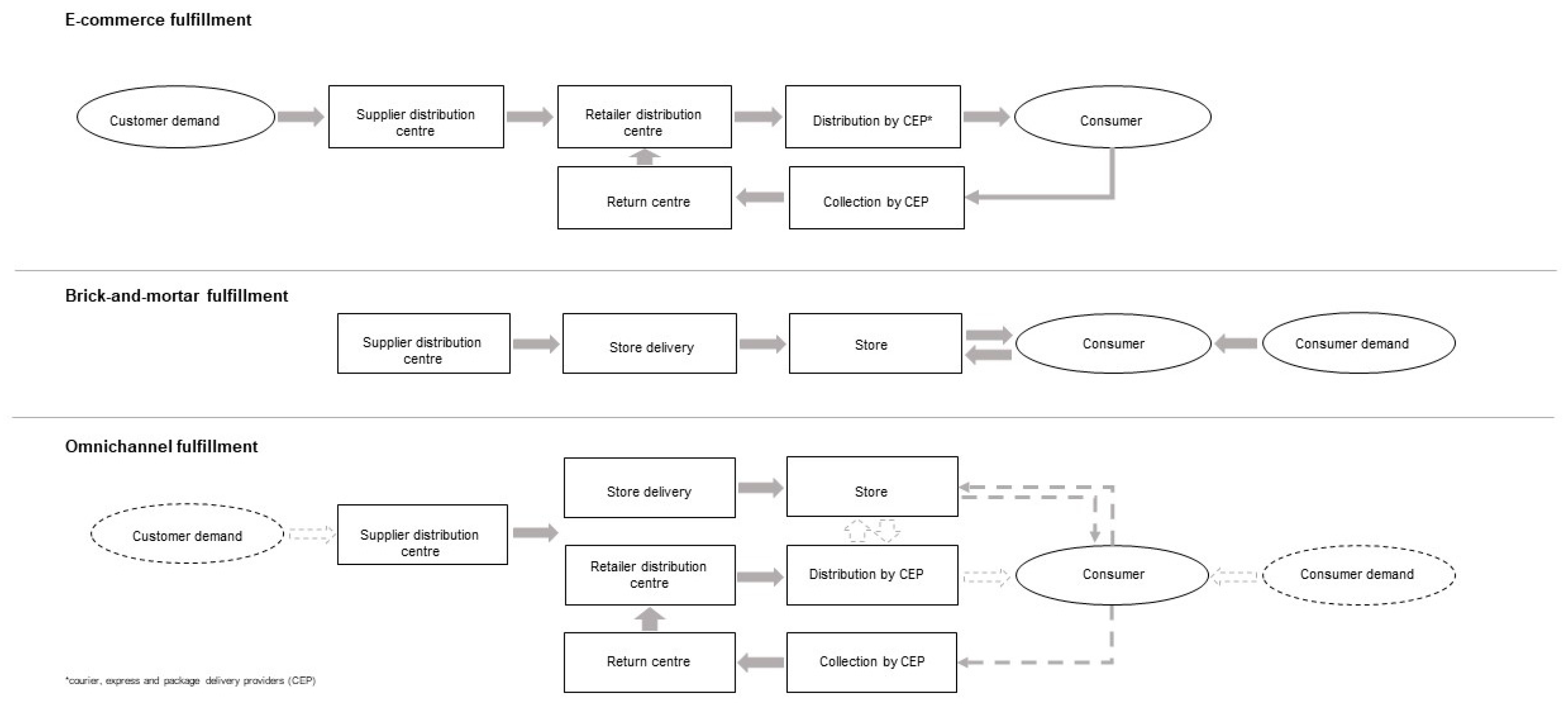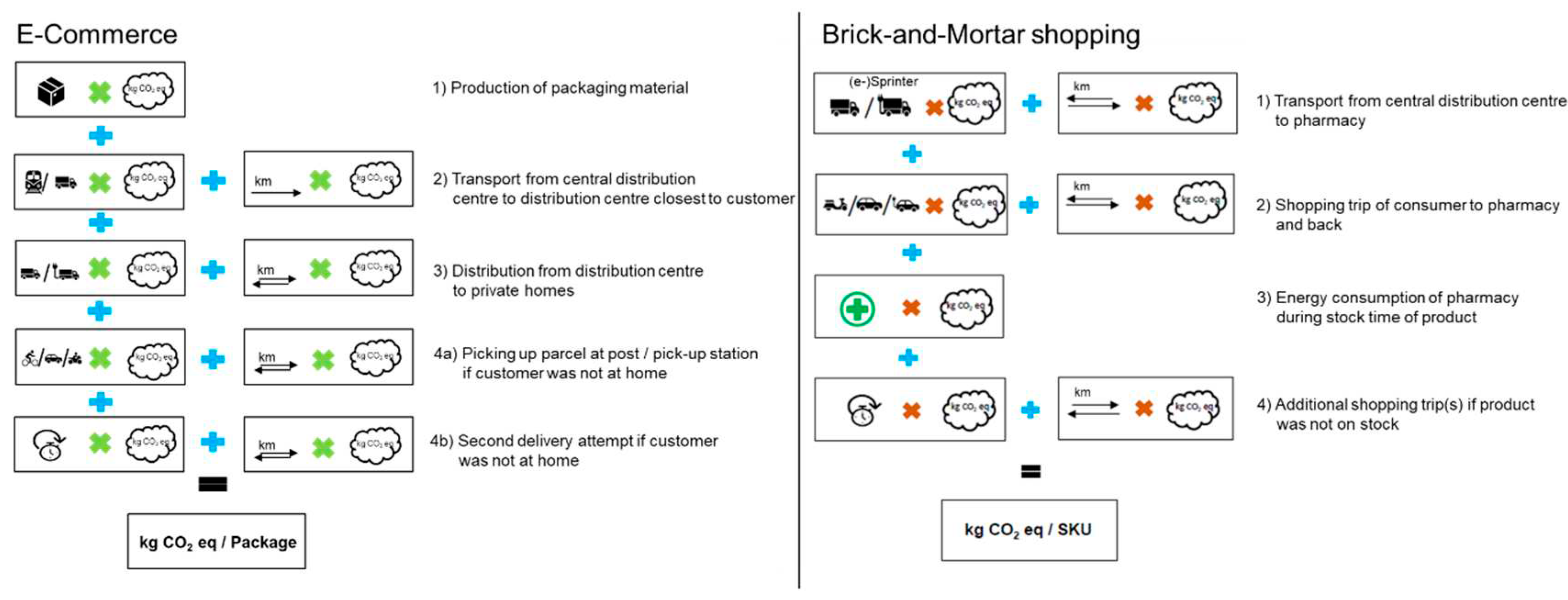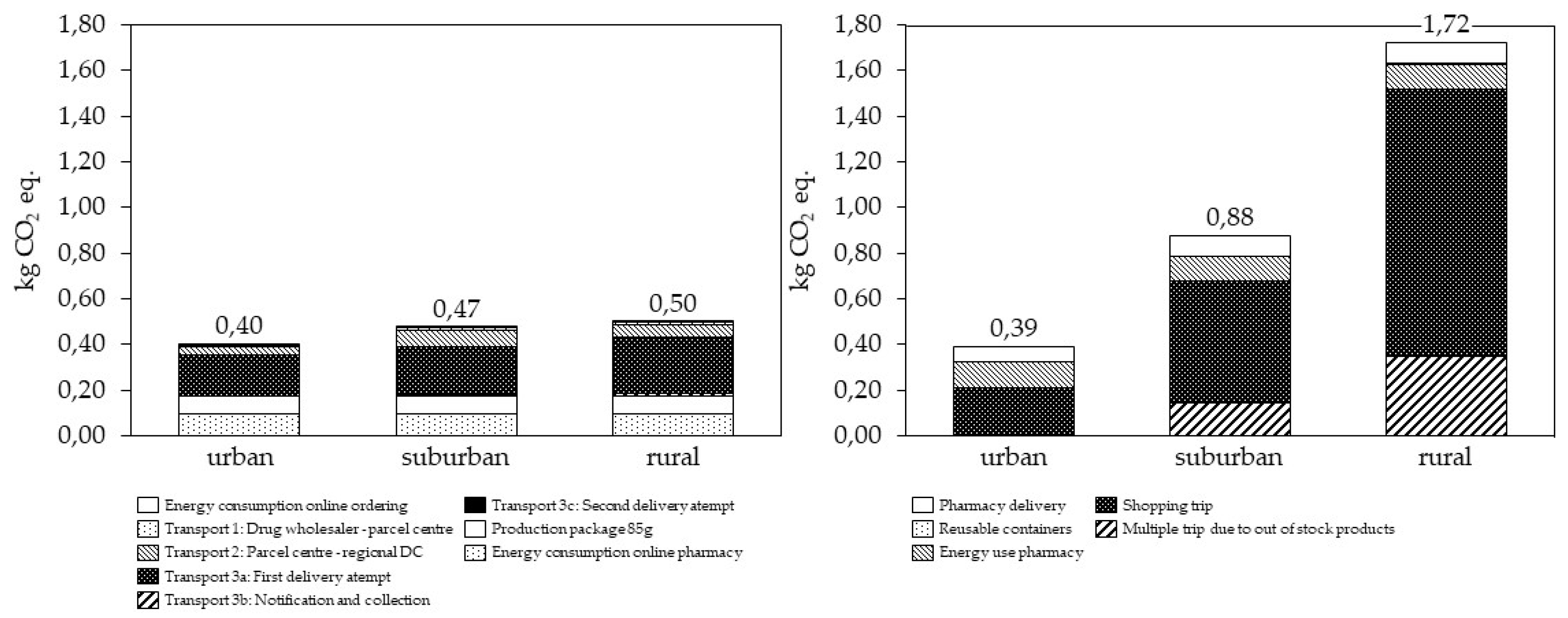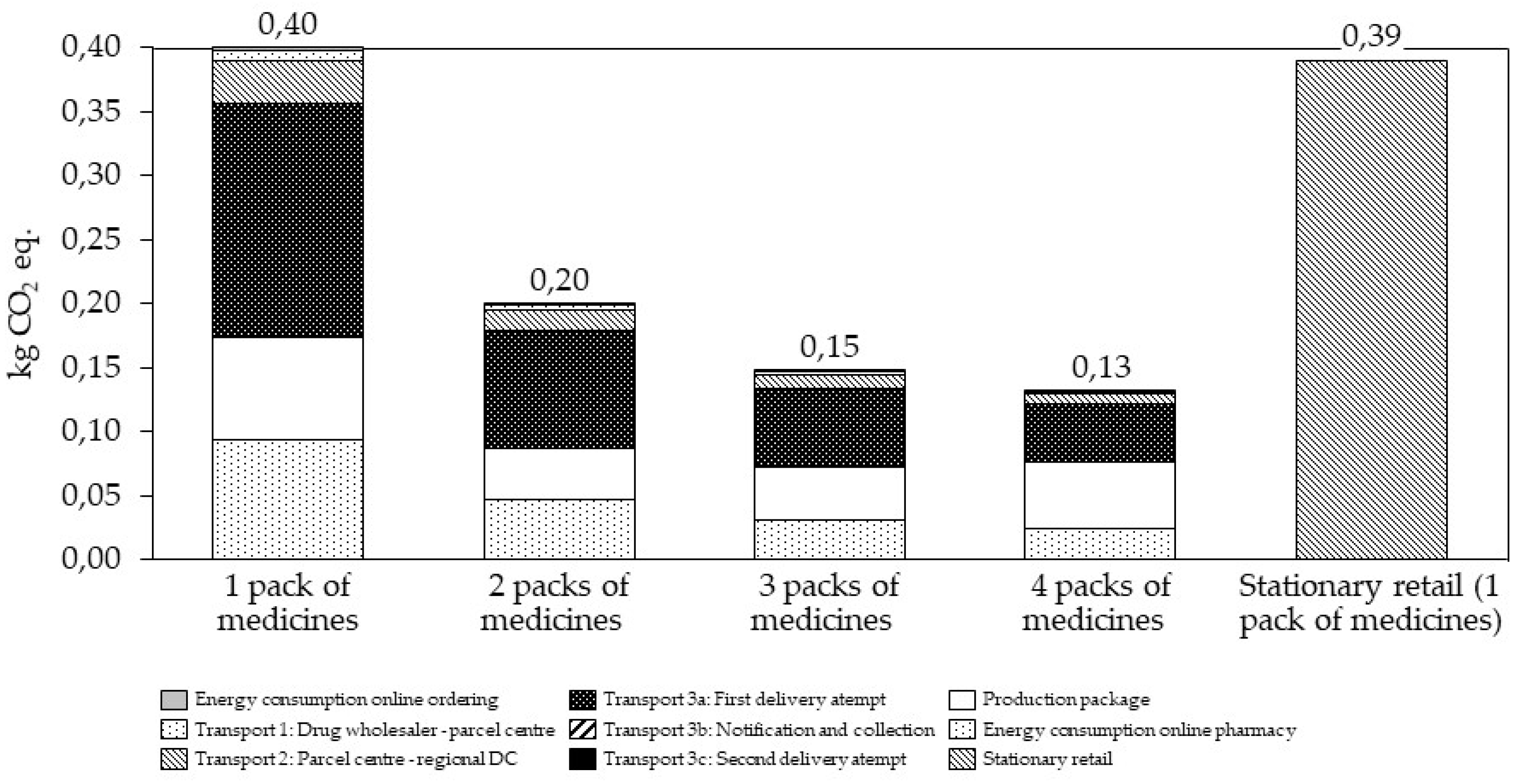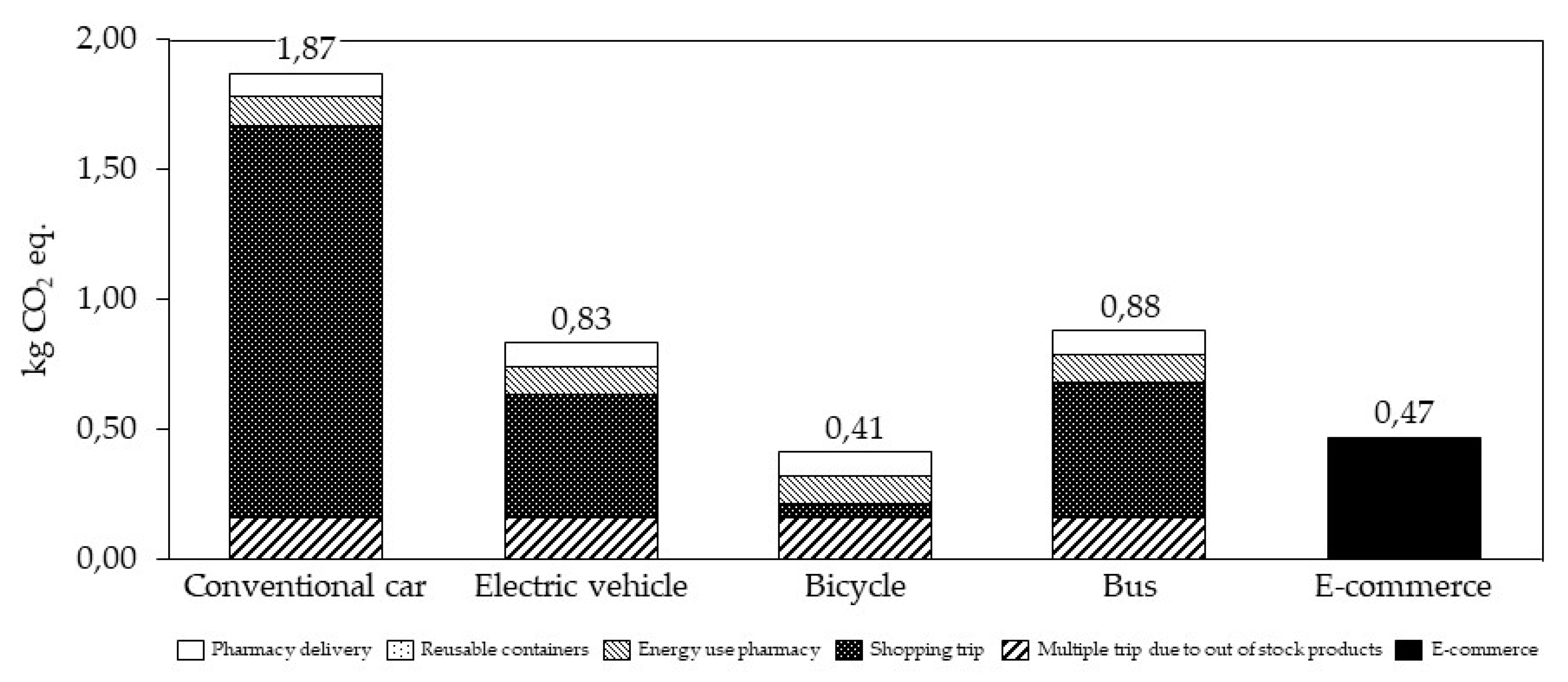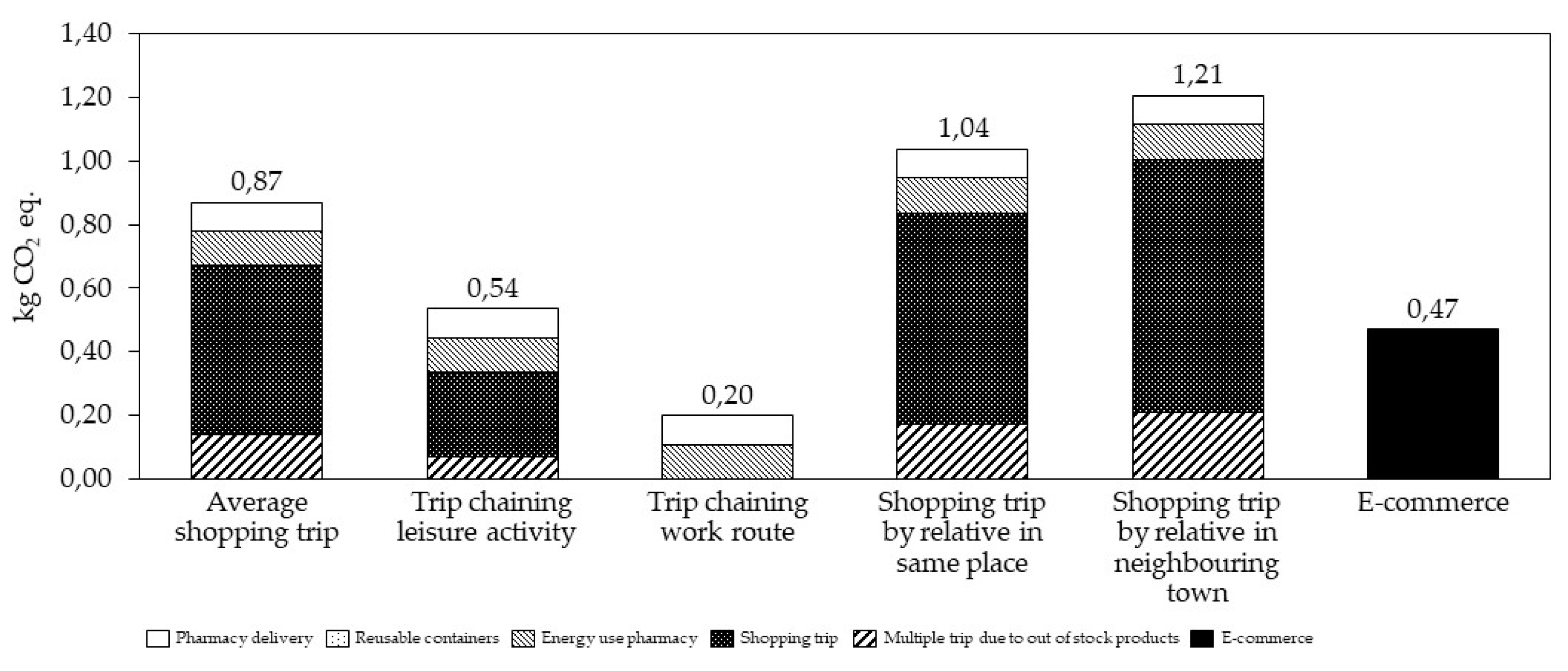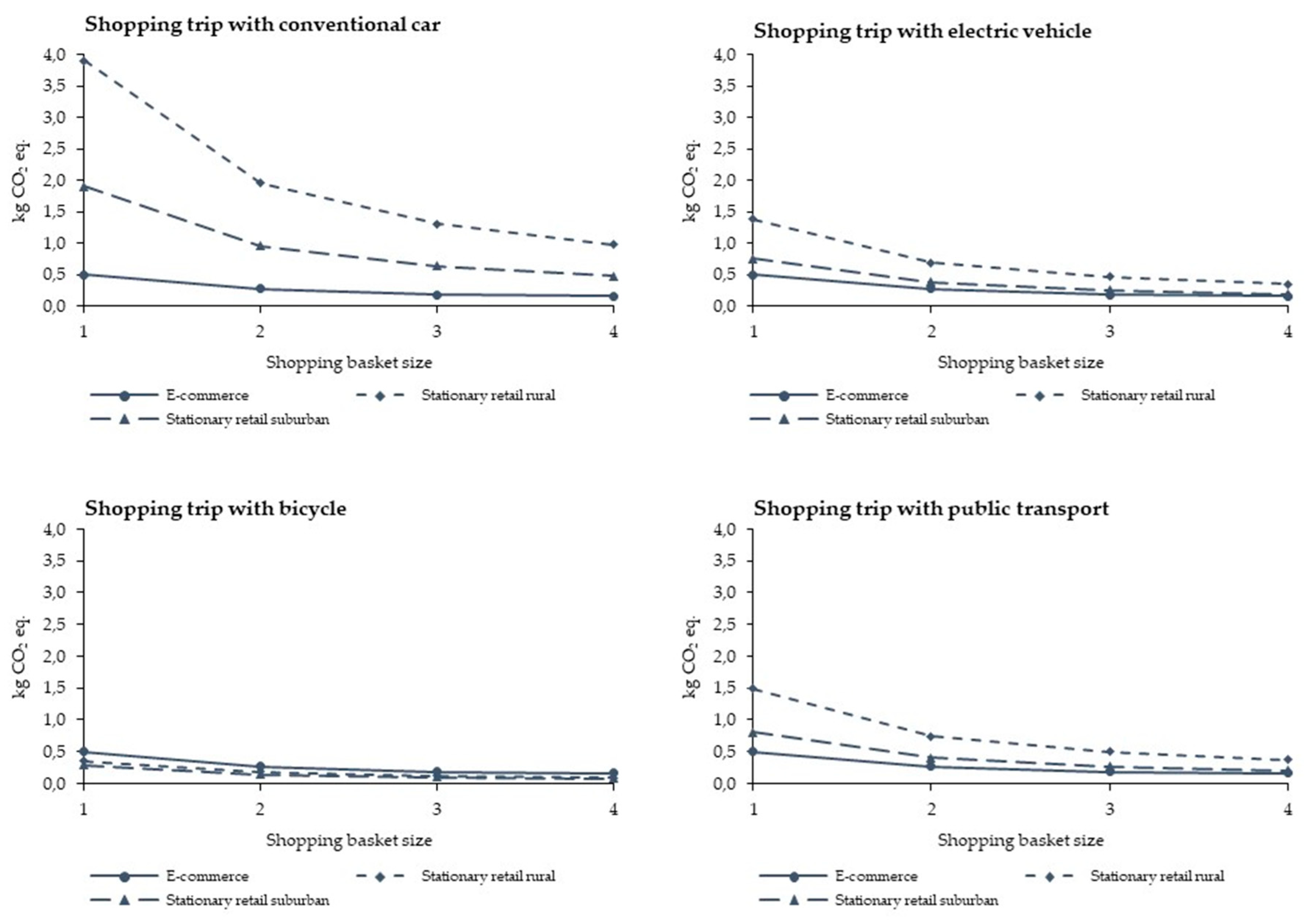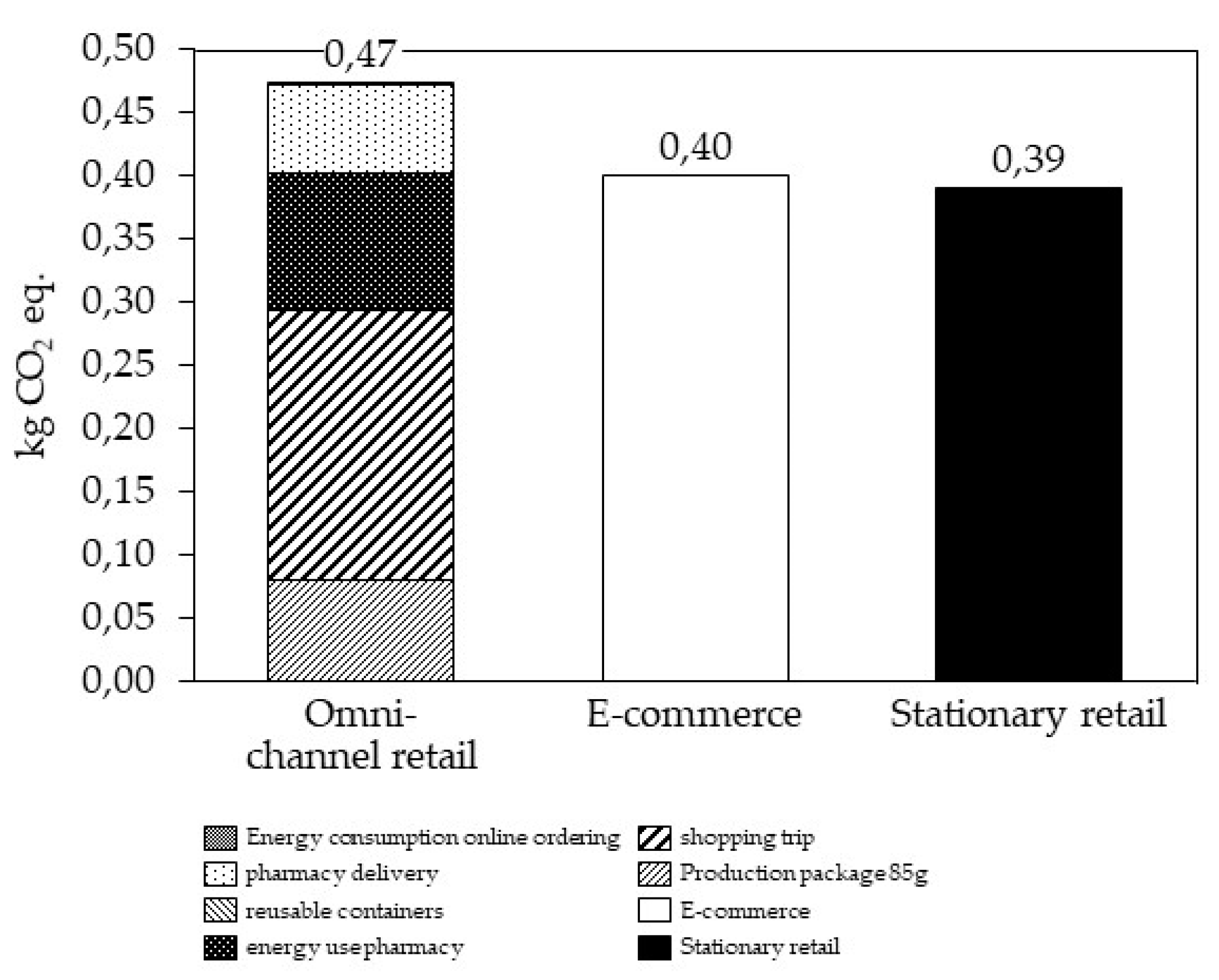1. Introduction
Online shopping has become increasingly popular over the last years. It can generally be defined as a purchase made by a consumer from a business through an online channel, also known as Business to Consumer (B2C). In some cases, shoppers may search for information prior to their purchase on the internet
1. On a global level, e-commerce represents 19% of global retail trades in 2021 and is expected to grow at a compound annual growth rate of 14.7% from 2020 to 2027
2, 3. In Switzerland, the value of online orders at home and abroad amounts to 15% of the total volume of retail trade in 2022
4. Depending on the sector, this value varies between around 4% for food and 50% for consumer electronics
5. This trend experienced an additional boost from the COVID-19 pandemic
6. In addition, retailers are increasingly pursuing omnichannel strategies that enable a seamless shopping experience where brick-and-mortar and online shops blur and merge
7, 8. This is leading to conventional in-store purchases with online extensions through mobile web shops, as well as online purchases with physical extensions through services such as click-and-collect, ship-from-store and return of online purchases in shops
7. These advancements have brought the management of the order fulfillment more to the forefront as retailers need to offer a variety of options for finding, buying, and returning goods across bricks-and-mortar stores and webshops
9. No matter what sales channel is chosen, the order flow generally begins with the customer’s purchase initiation and is completed when the purchase is received. The purchase initiation can take place either in the retail shop or online. The product inventory available to the customer to fulfil the purchase can be located in a retail shop, a retailer’s distribution centre, or a supplier’s distribution centre. Rapid developments in information technology have enabled flexibility in inventory and fulfilment resources
8. As different retail channels require different supply chain configurations to meet customer demand (see
Figure 1), this also results in different environmental impacts triggered by the choice of online vs. conventional shopping of consumers.
Since online shopping has consistenty been growing during the last years, the question of its environmental friendliness has been raised by customers, companies, and organisations. Subsequently, the paper at hand aims at contributing to this question by analysing the CO2-equivalent (CO2-eq.) emissions of online and brick-and-mortar shopping for the case of pharmaceutical products. To conduct the analysis, primary data from medication sales and supply chain operations in both channels, online and brick-and-mortar, of a Swiss reatailer are used.
To achieve this goal, the following research question RQ and sub-questions SQ were addressed:
RQ: Does online or brick-and-mortar shopping of pharmaceutical products lead to lower CO2-eq. emissions?
SQ1: How do spatial aspects concerning the residential location of consumers affect the CO2-eq. emissions of brick-and-mortar and online retail channels?
SQ2: How does the basket size of the consumer’s order influence the CO2-eq. emissions of online and brick-and-mortar shopping?
SQ3: How does the consumer’s choice of transport mode influence the CO2-eq. emissions of online and brick-and-mortar shopping?
SQ4: How do trip-chain decisions of the consumer influence the CO2-eq. emissions of online and brick-and-mortar shopping?
SQ5: How does the use of omnichannel retail channels affect the CO2-eq. emissions?
By answering these research questions, this paper contributes to understanding the environmental impacts of different shopping channels in different regional contexts and to extend the current state of quantitative research in this field. The remainder of this paper is organised as follows:
Section 2 provides the state of the art in literature related to the topic under investigation.
Section 3 explains the methodology of this study and
Section 4 presents the results.
Section 5 is dedicated to the outcomes of the sensitivity analysis, whereby the individual Section 5.1–5.4 deal separately with bundling effects, mode of transport choice, trip-chaining, and omnichannel strategies. The discussion of the results is confined to section 6, and the limitation and conclusion are presented in in section 7.
2. Literature Review
The scientific literature dealing with the environmental impact of online and offline retail channels is quite extensive and has been researched for quite some time. On the one hand there is literature that finds evidence for a reduction in environmental impacts with the rise of e-commerce. An example is Wiese, Toporowski and Zielke 10 who compare the transport-related CO2 emissions of in-store and online retail in the apparel sector. They found that online retail generates less CO2 emissions under many conditions. However, brick-and-mortar stores were found to be more environmentally friendly when distances between the consumer’s home and the store are short and when public transportation is used to visit the store. Other results suggesting environmental benefits of online retail models were found by Pålsson, Pettersson and Hiselius 11. In their research they compare the energy efficiency of shopping in physical stores and through online channels. Therefore, they analyse different studies in this field on different types of goods and compare their energy efficiency. The results show that in most cases, the total energy consumption of home delivery systems is lower than in distribution systems with physical stores. The main differentiators are personal transportation to stores by car and additional packaging in e-commerce. Energy consumption associated with freight transportation and buildings are of the same order of magnitude for both distribution channels. The results of Jaller and Pahwa 12 also point to a large potential for reducing vehicle miles travelled (VMT) through widespread adoption of omnichannel shopping (-6.5–7.0%) and single-channel online shopping (-87.6%). In terms of NOx emissions, on the other hand, the authors find a potential increase of 24% through the use of single-channel online shopping. The study examines the impact of shopping behaviours of different demographic groups on environmental impacts in Dallas and San Francisco using the American Time Use Survey. This also takes into account the different shopping habits of the two cities, with people in San Francisco more likely to shop in stores than people in Dallas.
On the other hand, there is a body of literature that suggests opposite findings. For instance, the results of Shahmohammadi, Steinmann, Tambjerg, van Loon, King and Huijbregts 13, which indicate lower GHG emissions for brick-and-mortar stores than those of pure online players but higher emissions than those of brick-and-clicks. Most of the GHG emissions can be attributed to upstream and last-mile transports. Furthermore, the basket size is identified as the dominant source of variability across all retail channels investigated. The authors followed a stochastic approach to assess the GHG emissions of Fast Moving Consumer Goods (FMCG) in the UK. This allowes the authors to quantify each source of variability and apply it to the overall results. The analysis by Van Loon, Deketele, Dewaele, McKinnon and Rutherford 14 also investigates the factors that contribute most to the environmental performance of different fulfilment methods for FMCG in the UK and other regions. They identify consumer transport, parcel networks, the physical store, and the transport between the factory and the distribution centre as key contributors. The results show large differences between the different fulfilment methods. Brick-and-mortar, brick-and-click, brick-and-collect, and pure online players with exclusively local van delivery have the lowest and very similar global warming potential. In contrast, pure online players with parcel delivery services, as typically operated by large online retailers, reveale the highest environmental impacts.
The literature that does not show a clear advantage for any of the retail models accounts for the largest share. This is also the case for a study from Hischier (2018) whereby Life Cycle Assessment was performed to analyse the ecological impacts of two different consumer behaviours in Switzerland: online purchase and in-store purchase. The focus of this study was fashion retail. Furthermore Hischier 15 investigated a broad range of variables by carrying out a perturbation analysis to identify the key factors influencing the environmental impacts. The analysis shows that individual travel is a major contributor to in-store purchases. Concerning online purchases the various transport steps and the packaging are mainly responsible for the environmental impacts. The comparison of the two shopping behaviours shows no clear tendency for any of the two, as everything depends on the individual consumer decisions. These findings are supported by Le, Carrel and Shah 1 who conducted a more qualitative study on online shopping compared to in-store shopping. They synthesise the literature to generate an in-depth understanding of the relationship between online shopping and travel. The study finds more evidence suggesting that online shopping substitutes for shopping travel. Slightly fewer papers report opposite findings. Since their results do not broadly support that online shopping is an effective tool for travel demand management, they conclude that behavioural interventions are more effective in response to the rise of e-commerce. The master thesis by Weideli 16 estimates and compares the greenhouse gas (GHG) emissions across the retail supply chain for different shopping behaviours in the US, from the traditional in store shopper to the cybernaut who searches for goods, purchases, and returns them online. He considered three types of products with different characteristics such as a laptop, a barbie-doll and a t-shirt. Weideli 16 also accounts for the difference in customer locations such as urban and suburban areas. When comparing the generic online and traditional in-store shopping behaviours, online shopping tends to be more efficient than traditional shopping. However, with the emergence of wider combinations of brick-and-mortar and online offerings the results tend to be less clear and require a case-by-case evaluation. This issue was also raised by Rai 7 who conclude that due to the continuous adoption of new retail models (omnichannel, click and collect etc.) it becomes increasingly difficult to understand the environmental implication of different consumer behaviours, as the particular in-store or virtual shopper do not exist anymore.
The literature analysis has provided multi-faceted insights into the impacts of different shopping channels (see
Table 1 for an overviews of findings from the literature). Firstly, it was found that quantitative analyses assessing the environmental impacts of online and brick-and-mortar retailing based on case studies of retailers and logistics service providers are not extensive. In most analyses, the data was based on assumptions rather than real data. Secondly, no clear conclusions could be drawn regarding environmental sustainability, which is further complicated by the emergence of combinations of online and in-store retailing. Thirdly, the geography of consumption, whether consumers live in urban, sub-urban or rural settings, was neglected or only briefly discussed in most studies, although this aspect influences transport distance, vehicle utilisation, and transport modes parameters. This also touches upon the issue of spatial organisations of retail supply chains as a whole (including store and warehouse locations), which are key determinants of the environmental impacts of different consumer locations. The need for a better understanding of different regional contexts was also specifically stressed by Rai
7, Weideli
16 and Van Loon, Deketele, Dewaele, McKinnon and Rutherford
14.
3. Methodology
For the paper at hand, a quantitative research design was chosen. The generate the data in a high level of detail and have them on a comparable basis, a single case study was condcuted. Single case studies are beneficial if topics are new or need a high level of detail for analysis 17, 18. The latter is the case for the study at hand. The case company is a Swiss pharmaceutical wholesaler that supplies doctors, surgeries, and pharmacies, and operates an online pharmacy and brick-and-mortar pharmacies. The data was supplemented by fulfilment data from Swiss Post. This allowed to map the supply chains of online and physical drug sales channels. This case study provided the basis for the quantitative assessment of the CO2-eq. emissions of the supply chains processes in both channels following a Life Cycle Assessment (LCA) approach. Subsequently, a sensitivity analysis was conducted to find out the most relevant influencing factors. In a final step, the extracted results were condensed and summarised.
To conduct the analysis, two different supply chains were investigated. The first supply chain is the e-commerce supply chain (left side of
Figure 2). The second supply chain is the brick-and-mortar supply chain (right side of
Figure 2).
Data basis and collection: In order to determine the spatial effects on the environmental impact of e-commerce and brick-and-mortar retail in Switzerland, four regions were defined for the analysis. These correspond to important sales markets of the pharmaceutical wholesaler under investigation. Within these regions, four localities were determined which, based on their population density, could be assigned to different types of areas with an urban, intermediate and rural character (
Table 2 and
Table 3).
Table 2.
Cirteria of the area typology used in this study.
Table 2.
Cirteria of the area typology used in this study.
| Type of Areas |
Population Density |
Number of Employees |
| Urban centres |
>1500 inhabitants per km2
|
>10′000 |
| Suburban areas |
300–1500 inhabitants per km2
|
1′000-10′000 |
| Rural areas |
< 300 inhabitants per km2
|
<1′000 |
Table 3.
Overview of the population density and the number of employees per locality investigated.
Table 3.
Overview of the population density and the number of employees per locality investigated.
| Region |
Inhabitants / km2 19
|
Number of employees 19
|
| Zürich |
|
|
| Zürich |
4′798 |
491′199 |
| Meilen |
1′218 |
5′910 |
| Wald |
404 |
3′460 |
| Turbenthal |
198 |
1′631 |
| Aargau |
|
|
| Aarau |
1′761 |
34′888 |
| Würenlos |
721 |
2′254 |
| Frick |
565 |
3′756 |
| Ueken |
178 |
136 |
| Bern |
|
|
| Bern |
2′611 |
188′252 |
| Schwarzenburg |
152 |
3′204 |
| Ins |
149 |
1′676 |
| Röthenbach |
32 |
571 |
| Winterthur |
|
|
| Winterthur |
1′678 |
73′339 |
| Elgg |
203 |
1′565 |
| Hagenbuch |
135 |
196 |
Table 4.
Classification of the analysed localities by area type and region of analysis.
Table 4.
Classification of the analysed localities by area type and region of analysis.
| |
Region Zurich |
Region Aargau |
Region Bern |
Region Winterthur |
| Urban centres |
Zürich |
Aarau |
Bern |
Winterthur |
| Suburban areas |
Meilen, Wald |
Würenlos, Frick |
Schwarzenburg, Ins |
Elgg |
| Rural areas |
Turbenthal |
Ueken |
Röthenbach |
Hagenbuch |
For modelling the supply chains of e-commerce fulfilment, specific data on the route planning of the Swiss Post was collected. Information on the packaging material used and the energy consumption in the wholesaler’s factory comes from the pharmaceutical wholesaler under investigation. The distance travelled and the choice of transport mode for collecting the package from the post office are based on microcensus data from the Federal Statistical Office (FSO) of Switzerland. The share of additional delivieries in case that the customer was not home was also takein into consideration. The data on power consumption for surfing the Internet is based on the average power consumption of a personal computer for 5 minutes.
The supply chains for brick-and-mortar retail were mapped based on data on pharmacy deliveries from the pharmaceutical wholesaler. The typical choice of transport and the distance travelled for the shopping trip of a consumer to the nearest pahrmacy for the brick-and-mortar szenario were taken from the microcensus data from the FSO. Information on the average heat and electricity consumption of a pharmacy is based on data from the EHI study “Energy Monitoring 2018” 20. Data from Pharma Suisse, the Swiss association for pharmacists, was used for the number of medicines sold and the number of pharmacies in Switzerland. Estimates on the availability of medicines in the brick-and-mortar retail come from the pharmaceutical wholesaler under investigation. We analysed scenarios with availability of medications, but also for additional shopping trips realted to the out-of-stock statistics from Pharma Suisse. Data on background processes such as the extraction of raw materials and associated energy consumption, the provision of electricity and fuels or the production of vehicles come from ecoinvent v3.
LCA: The study is based on life cycle assessment approach, an internationally recognised quantitative assessment methodology that evaluates the potential environmental impacts of products and services throughout their life cycle 21. This means that, as far as possible, this study takes into account the CO2-eq. emissions from all processes necessary for the delivery in online retail and for the purchase in brick-and-mortar retail of medicines. Therefore, all impacts resulting from the movement and storage of products from the wholesaler’s factory to the consumer are included in this study. In detail the online retail model includes all processes from the production of the packaging material, the energy consumption for the operation of the computer as well as at the wholesaler’s and the transport from the wholesaler via the postal service’s parcel centre to the nearest distribution centre were therefore taken into account. Furthermore, the last-mile fine distribution to households by Swiss Post was taken into account. In the case of unsuccessful initial delivery, the collection of the parcel by the recipient at the nearest post office or redelivery by Swiss Post was included. For the model of the physical store, the day and night deliveries of the pharmacies with different utilisation of the means of transport were taken into account. In addition, the shopping trip by the customer to the store and back was included. The energy consumption for the operation of the pharmacy as well as possible multiple trips by the customer if the medicine was not available and special reusable containers for the transport of the sales units were also included. Emissions associated with the actual manufacture, consumption and disposal of pharmaceutical products are not considered, as they are independent of the distribution channel chosen by the consumer.
The functional unit for the analysis at hand is the delivery of a medicine pack. The two main quantitative steps of the LCA are the life cycle inventory (LCI) and the life cycle impact assessment (LCIA). The LCI identifies the material, energy and substance flows into and out of each retail channel considered, and the LCIA characterises the impacts of these flows (Ernstof et al., 2019). To capture the LCI of representative unit processes, this study uses the ecoinvent v3 databases and SimaPro 8.0.3 software. The total CO2-eq. emissions caused by the supplay chain and resource use described in the inventory were quantified using the IPCC 2021 GWP indicator.
4. Results
In
Figure 3, the results for the different regions are summarised for online and brick-and-mortar retail in a pharmacy of medical products for the standard scenario comprising the acquisition of a single pack of a medication.
The results in
Figure 3 show that online retail performs better than brick-and-mortar retail in terms of CO
2 emissions across all regions investigated in suburban and rural areas. This means that the purchase of a medicine package at a pharmacy in rural areas emits 3-7 times more greenhouse gase (GHG) emissions than in online retail. In suburban areas, brick-and-mortar retail causes 2-4 times more GHG emissions than e-commerce. In urban areas, online and brick-and-mortar retail emit comparable CO
2 emissions. In this context, it is important to remember that in this standard scenario, the CO2-eq. emissions from the shopping trip in case of the brick-and-mortar option were derived assuming the average Swiss transport mix to take into account the average emissions of Swiss mobility. More specific results for selected vehicles will be presented later.
In addition, it can be observed that the increased transport volume for the delivery of parcels to intermediate and rural regions in e-commerce is of little significance in terms of CO2 emissions, since the vehicles of Swiss Post are optimally utilised and thus relatively few CO2 emissions are generated per parcel. In brick-and-mortar retail, on the other hand, CO2 emissions increase significantly the more rural the region. Here, too, relatively few emissions are caused by the delivery of the medicines to the pharmacy, but mostly by the shopping trip.
The hotspot analysis shows that in online retail the largest share of emissions is due to the initial delivery attempt on the last mile by courier, express and parcel (CEP) service providers. The production of packaging material and energy consumption in the wholesaler’s factory also account for a considerable share of the total emissions. Concering packaging, a crucial point is that each pack of medication is shipped in cardboard box for its protection. This cardboard box could contain a larger number of packages and sensitivity to this aspect will be analysed in the next section. In rural areas, a potential pick-up trip to the post office also contributes to a certain share of the CO2 emissions. The electrcity use for online shopping and movement and transhshipmnet of the pharmaceutical products before the last distribution of the parcels are less significant.
The reason for the high contribution of the initial delivery attempt on the last mile to the total emissions is that the parcels are distributed to the households with a 3.5 ton Sprinter, which has a relatively smaller load volume compared to the containers by rail and lorries. This results in relatively higher CO2 emissions per parcel and kilometre. The reason for the contribution of the packaging material is due to the heat-intensive manufacturing processes of cardboard.
In brick-and-mortar retail, mainly the motorised shopping trips contribute to GHG emissions. A small share is also attributable to the delivery and operation of pharmacies. The choice of transport for shopping trips in brick-and-mortar retail plays a decisive role in the total emissions. The contributions for shopping trips with a diesel or petrol car are particularly high. This is due to the low occupancy rate and the transport of a single medicine package.
The results of the analysed localities for e-commerce fulfillment show similar values in urban centres. The results for the suburban areas are also in the same range, with the exception of two outliers that can be attributed to the specificity of a certain region. The results for the rural areas show a higher variability, which can be explained by the fact that the route planning of the postal service varies greatly and depends on the local infrastructure. In brick-and-mortar retail, the results per area type have low variability, since standardised values from the FSO were used for the distance to the place of purchase, which accounts for the largest share of total CO2 emissions.
5. Sensitivity Analysis
In this section, the impact of relevant influencing factors on physical and online shopping channels are analysed. Four alternative scenarios and a combination of influencing factors were considered, focusing on the following aspects: (1) Shopping basket size, (2) Choice of transport mode, (3) Trip-chaining, (4) Omnichannel strategies. To provide a comparable analysis, the suburban case was used in the subsequent figures.
Shopping basket size: The results in
Figure 4 show the influence of the shopping basket size, i.e., the bundling of several orders of medicine packages, in online retailing on the CO
2 impact per unit of analysis using the example of urban regions. The results are compared with the purchase of a medicine package in a physical pharmacy. When a larger number of items are ordered, a significant decrease in the CO
2 impact per package of medicines can be observed. This is due to the fact that GHG emissions caused by the production of the packaging cardboard material (containing the pack of medicine) and by the transport are distributed over a larger number of ordered medicine packages. A closer look reveals that the CO
2 impact of the packaging material can increase in part with the size of the shopping basket. This is due to the fact that with an increasing number of medicine packages, a larger shipping package is needed. However, the increase in this contribution has hardly any effect on the overall burden due to the large savings from the lower transport emissions per pack of medicine.
Choice of transport mode: The second sensitivity analysis refers to the effect of the choice of transport mode for the purchase of one medicine package in the in-store on the total GHG emissions and compares it with e-commerce. The results are shown in
Figure 5 using suburban areas as an example, since shopping trips in non-urban areas are particularly significant due to the longer distance to the nearest pharmacy. In urban areas, it is generally assumed that a pharmacy can be visited on foot or by bicycle, whereas in suburban or rural areas, the trip by motorised vehicle is more likely as shown by the Swiss modal mix.
The results indicate a large reduction potential of CO2 emissions in bick-and-mortar retail trade for non-fossil based transport modes in suburban and rural areas. For example, GHG emissions could be more than halved if the shopping trip is made by electric vehicle or bus. The comparison with online retail makes it clear that buying a medicine package in suburban areas in a pharmacy pays off in terms of CO2 emissions only if the distance is covered by bicycle (or even on foot).
Trip-chaining: The third sensitivity analysis (
Figure 6) shows the effect of trip-chaining, i.e., the combination of shopping trips with other activities on the CO
2 impact of brick-and-mortar retail. The results are presented using the example of suburban areas. The activities considered in this context are, on the one hand, leisure activities or the way to work. On the other hand, in the context of pharamceutical trade this also includes the shopping trip by a relative or acquaintance, who takes the medication for the consumer with them when they go shopping. In case of trip-chaining with a leisure acitivity, only half of the emissions from transport were allocated to the shopping trip. If the shopping trip is combined with the commute to work, no emissions were allocated to the shopping trip, since it can be assumed that the commute takes anyway place and the shopping trip would lead to a minor detour at most. In the case of purchases by relatives or acquaintances, the distance from their home to the end consumer (and back again) is taken into account and it is assumed that the relative or acquaintance lives in the same locality or in a neighbouring town.
The comparison of the results with e-commerce shows that brick-and-mortar retail in suburban areas is only worthwhile if the purchase of a medicine package can be combined with the commute to work.
Bundling effects and choice of transport mode: Figure 7 shows the effects of different shopping basket sizes for different modes of transport on the CO
2 emissions in brick-and-mortar retail in comparison to the CO
2 emissions in e-commerce in suburban and rural regions.
The results show that online retail is beneficial in terms of CO2 emissions in suburban to rural areas for all the shopping basket sizes examined compared to a shopping trip to a pharmacy with a diesel or petrol car. Furthermore, it can be derived that e-commerce is to be preferred up to a shopping basket size of three medicine packages, if the distance to the physical shop is covered with an e-vehicle or on foot. From a basket size of four medicine packages upwards, the GHG emissions of online and brick-and-mortar retail are comparable in suburban areas. Even with an e-vehicle, shopping at the pharmacy in rural areas is worse in terms of CO2 emissions than e-commerce, also if several medicine packs are purchased at once. If, on the other hand, the shopping trip can be made by bicycle, the in-store retail performs better than online retail in terms of CO2 emissions for all basket sizes examined. Similar to e-vehicles, shopping in a brick-and-mortar store in urban centres by public transport shows only lower CO2 emissions from a shopping basket size of four medicine packages. For purchases of one to three medicine packages in suburban and one to four medicine packages in rural areas, e-commerce is the option with the lowest CO2 emissions.
Omnichannel strategies: Traditional brick-and-mortar retail in particular is increasingly transforming into an omnichannel retail concept. This includes online extensions of traditional brick-and-mortar shopping through services such as Click&Collect (or buy online—pick up in store), in-store shipping, and in-store returns of online purchases.
Figure 8 shows the impact of Click&Collect for a medicine package in an urban setting. The Click&Collect use case was chosen because it is the only omnichannel strategy possible in the retail sector for pharmaceuticals, as they cannot be returned by the consumer. The results show that omnichannel retail leads to higher CO
2 emissions per unit of analysis due to the logistics required for an online purchase and the need for an additional shopping trip by the customer. These results would be even more pronounced for suburban and rural areas. Bundling opportunities also remain limited in the Click&Collect retail channel, as orders are unpredictable and typically shipped the same or next day.
6. Discussion
The results of the study show that online retail is preferable to traditional brick-and-mortar retail with regard to CO2 emissions in rural and suburban areas in all study regions. In urban areas, the CO2 emissions of online and offline retail channels show comparable values. If the shopping trip is made on foot or by bicycle, even fewer CO2 emissions are attributable to in-store retail.
A closer look at the main sources of CO2 emissions shows that in e-commerce, the last-mile distribution to the households caused the biggest impacts. The further the destination is from the parcel distribution centre, the more transport kilometres are covered especially in rural regions and regions with poorer infrastructure, hence leading to higher emissions. However, since in these regions the shopping trip by car in traditional retail are also longer and have a greater impact than the final delivery on online shopping, e-commerce proves to be more advantageous in all the cases examined. A considerable share of the CO2 emissions in e-commerce is also due to the production of the packaging material and the energy consumption in the wholesaler’s factory.
In brick-and-mortar retail in suburban and urban areas, CO2 emissions resulting from the shopping trip dominate. The delivery and operation of the pharmacies also have a significant share in the total GHG emissions.
Similar to this study, the notion of spatial differences was also taken up by Wiese, Toporowski and Zielke 10 by examining the impact of population density on the benefits of online shopping. In general they assumed that high population density could be equated with short distances to stores. Therefore, the authors tested the hypothesis of whether the use of traditional retail in urban, densely populated areas causes less CO2 emissions. They investigated up to which break-even point traditional retail is beneficial from an environmental perspective. According to their results, the break-even point is 14 km (one-way). Brick-and-mortar retail generally performed better than online retail when the distance between customers’ homes and the store is shorter, due to lower CO2 emissions from retail by the shopping trip. The study by Pålsson, Pettersson and Hiselius 11 identified a break-even points for the passenger transport distance (roundtrips) of 2.3-7.7 km and 9.4-14.4km for books in suburban and urban areas respectively. This means that, if a consumer lives more than 1.2-3.9 km from a store (since a shopping trip includes the route to the shop and back home), e-commerce was more energy-efficient in urban and suburban areas. Also, Weideli (2013) studied the spatial differences in customers’ mode choice (own car vs. public transport) with respect to urban and suburban areas. He found evidence that for customers living in suburban areas, online shopping may be more appropriate, while for urban residents, traditional shopping is more environmentally friendly. These findings are consistent with the results of this study and support the hypothesis that e-commerce in suburban and rural areas is beneficial in terms of CO2 emissions when a shopping trip is made for only one item. However, the results of this study suggest that the break-even point for pahrmaceutical products in Switzerland for a round trip will be less than 5 km, as this is the average distance to a pharmacy in Switzerland in suburban areas. This is one-third of what was found by Wiese, Toporowski and Zielke 10. These differences can be explained by the difference in supply chains configurations for online retail with respect to kilometers, which in the study of apparell of Wiese, Toporowski and Zielke 10 are significantly higher compared to the distance covered in online medicine retail in Switzerland.
Considering the applicability of the results to the national context, e-commerce could be an interesting alternative for the population in rural and suburban areas. According to the structural data of the permanent resident population 2021 22, around 63% of the population in Switzerland lives in so-called urban core areas, around 22% live in areas of influence of urban cores and around 15% live in areas outside the influence of urban cores. Thus, for 15 to 35% of the Swiss resident population, online trading of medicines could be a more environmentally friendly alternative, unless a visit to a pharmacy can be combined with another activity. For 63% of the resident population, brick-and-mortar shopping would be preferable, provided that the shopping trip is not made by motorised means.
Limitations: The limitations of the present study can be divided into two areas, (a) methodical and (b) content related limitations.
(a) In terms of methodology, only the global warming potential in CO2 equivalents was analysed in this study. The environmental impacts in other impact categories addressing further emissions or resource consumption, were not considered. For a holistic view of the challenges in the sustainable fulfillment of medicines, other indicators addressing damage to human health, ecosystem, and resources should also be considered in further steps. Another methodological limitation results from the sensitivity analysis regarding the combination of shopping trips with a leisure activity or commuting to work. Here, it was assumed that all emissions fall on the commute, as these would occur anyway. Here, it could be analysed in more detail what maximum detour is allowed so that brick-and-mortar retail remains advantageous in the scenario considered.
(b) The content related restrictions refer on the one hand to the definition of the system boundary. For example, in the case of the online retail channel, the CO2 emissions that result from the disposal of the packaging material were not taken into account. On the other hand, the purchase of medicines was only analysed in the context of online and brick-and-mortar retail channels, but not the purchase directly from the doctor. However, it can be assumed that CO2 emissions tend to be higher when purchased from a doctor than from brick-and-mortar retail, since the bundling effects are lower for delivery. Express deliveries by courier were also not part of the analysis. However, interviews with pharmacies show that courier deliveries for pharmacies are only carried out in extremely rare cases and can therefore be neglected. Finally, with regard to the system boundary, it should be mentioned that the CO2 emissions from the production of medicines were not taken into account. Here, too, there could be major differences from medicine to medicine, but these are not relevant for the present study, since only delivery fulfillment of the medicine to the consumer was taken into account. However, the relative contribution of transport compared to the production of a medicine represents a further lever for optimising emissions and could be analysed in greater depth. For products whose production is extremely CO2-intensive, optimisation in distribution could ultimately be less relevant than for medicines that are less CO2-intensive on the production side.
Finally, concrete savings on CO2 emissions will ultimately only occur, if in the time saved by the consumer thanks to online shopping, the consumer will not opt for an additional activity (for example leisure activity which would not have been possible due to time constraints when shopping) performed by combustion car. An aspect, which was out of the scope of this study.
Further research directions: To validate the spatial effects found in this research, further studies should be conducted in other countries and regional contexts, as well as for other consumer products. In addition, the regional effects of trip-chaining should be analysed in more depth in order to refine the allocation logic of emissions to the combined activities.
Both, economic and social sustainability were not discussed in the paper at hand. Social sustainability might be particularly relevant in two ways: brick-and-mortar pharmacies support a homogeneous share of pharmaceutical jobs in the whole country whereas e-commerce warehouses concentrate the needed jobs at one specific place for the whole country. Furthermore, pharamcies are points of social interaction, especially for elderly and socially not well integrated people. Subsequently, the social sustainability of e-commerce and brick-and-mortar shopping should be emphasised in a future study.
Next, when analysing vehicle technologies, battery-electric vehicles typically show lower CO2-eq. emissions per km than combustion engines when recharged with electricity which does not come from fossil sources see, for example, 23. In this study, standard Swiss electricity was considered in the calculations. Nevertheless, further studies should emphasise how energy for the battery-electric vehicles is generated to differentiate the CO2 emissions to a greater extent and understand how the conclusions of this study would change in countries with different electricity mixes.
The system boundary of this study excluded certain things like raw material extraction for all, the product, its packaging, and the production of the used vehicles and infrastructure, manufacturing and distribution from manufacturing site to distribution center, etc. This could be integrated in a future study, if repeated for other products.
Finally, it is assumed that the faster the request for delivery form a consumer is, the less a logistics service provider can benefit from bundling effects and subsequently, the smaller become the ecological benefits from online-shopping. Hence, the environmental impacts of online delivery services aiming at satifying customers’ needs as quickly as possible should be analysed in more detail in the future.
6. Conclusion
This paper contributs to the discussion on the environmental sustainability of online vs. brick-and-mortar shopping of pharmaceutical products by quantifying the CO2-eq. emissions of the two distribution options in four urban, suburban and rural areas of Switzerland. The influence of shopping basket size, choice of transport mode, trip-chaining and omnichannel strategies were investigated. Overall, it can be determined that online shopping is more advantageous than brick-and-mortar shopping in several situations, as less CO2 is emitted. This is especially true in suburban and rural areas. In contrast, buying medicines in brick-and-mortar stores proves to be the CO2-saving option in urban areas, especially if the route to the pharmacy is made on foot or by bicycle. Bundling effects can make a relevant contribution to reducing overall emissions in both online and offline retail. In addition, choosing a more environmentally friendly mode of transport such as an e-car, public transport or a bicycle can significantly reduce emissions in brick-and-mortar retail. Consequently, the research questions cannot be answered with a universal answer highlighting how conclusions depend on the specific context and cannot (and should not) be generalised.
The paper adds to the existing body of knowledge in several ways. First, there are particular differences when it comes to the environmental benefits of e-commerce. The further the consumer lives away from a pharmacy and the higher the CO2 emissions from using a motorised mode of transport for the shopping trip, the more beneficial online shopping is. The biggest effect comes from the bundling effect and route optimisation that a logistics service provider has when delivering multiple orders on the same route. Second, the shopping basket size has a significant impact on the environmental benefits of online shopping. This analysis is new in the literature and should be considered in future studies. Third, the mode of transportation affects the outcomes of brick-and-mortar shopping and should therefore be considered in future research trials. Finally, omnichannel, which is recognised as a way to help brick-and-mortar stores survive in the context of digitisation, has its drawbacks. Depending on their choice of transportation, consumers may use a combustion engine vehicle to drive to a store to pick up items they previously ordered online. Or consumers first go to a store to see a product, then drive home and order it online, causing next to their shopping trip a logistics service provider trip for product delivery. As a result, omnichannel causes additional CO2 emissions due to the additional delivery of products ordered online, which should be considered in the discussion around omnichannel opportunities as a solutionfor the survival of physical stores.
Author Contributions
The conceptualisation of the study was done by Maike Scherrer, the validation of the provided data and the LCA was conducted by Viola Rühlin. Andrea Del Duce reviewed the results and supported in questions related to the LCA. The first draft of the paper was written by Viola Rühlin and reviewed/reworded in a first round by Maike Scherrer and a second round by Andrea Del Duce. Funding acquisition and project administration was done by Maike Scherrer. All authors have read and agreed to the published version of the manuscript.
Funding
This research was funded by a Swiss pharmaceutical company, offering both, online and brick-and-mortar stores.
Data Availability Statement
Data was used from the federal statistics office of Switzerland (
www.bfs.ch), by ecoinvent (
www.ecoinvent.org), by the Swiss Post, and the pharmacy under investigation.
Acknowledgments
Many thanks to the editors and reviewers to taking their time to review this paper at hand and to make valuable suggestions to strengthen the contribution of this paper.
References
- Le, H. T.; Carrel, A. L.; Shah, H. Impacts of online shopping on travel demand: a systematic review. Transport Reviews 2022, 42 (3), 273-295. [CrossRef]
- GrandViewResearch. E-commerce Market Size, Share & Trends Analysis Report By Model Type (B2B, B2C), By Region (North America, Europe, APAC, Latin America, Middle East & Africa), and Segment Forecasts, 2020 - 2027; 2020. https://www.grandviewresearch.com/industry-analysis/e-commerce-market/toc (accessed 28.03.2023).
- Cramer-Flood, E. Worldwide Ecommerce Forecast Update 2022. 2022. https://www.insiderintelligence.com/content/worldwide-ecommerce-forecast-update-2022#page-report (accessed 2023 28.03.).
- Zumstein, D.; Oswald, C.; Brauer, C. Online Retailer Survey 2022; Institut of Marketing Management, Winterthur, 2022. https://handelsverband.swiss/wp-content/uploads/2022/10/221013_Zumstein-et-al_OnlineRetailerSurvey_2022.pdf.
- Wölfle, R.; Leimstoll, U. E-Commerce Report Schweiz 2020. Digitalisierung im Vertrieb an Konsumenten. Eine quantitative Studie aus Sicht der Anbieter.; FHNW, Olten, 2020.
- Feichtinger, S.; Gronalt, M. The Environmental Impact of Transport Activities for Online and In-Store Shopping: A Systematic Literature Review to Identify Relevant Factors for Quantitative Assessments. Sustainability 2021, 13 (5), 2981. [CrossRef]
- Rai, H. B. The net environmental impact of online shopping, beyond the substitution bias. Journal of Transport Geography 2021, 93, 103058. [CrossRef]
- Taylor, D.; Brockhaus, S.; Knemeyer, A. M.; Murphy, P. Omnichannel fulfillment strategies: defining the concept and building an agenda for future inquiry. The International Journal of Logistics Management 2019. [CrossRef]
- Hübner, A.; Holzapfel, A.; Kuhn, H. Distribution systems in omni-channel retailing. Business Research 2016, 9, 255-296. [CrossRef]
- Wiese, A.; Toporowski, W.; Zielke, S. Transport-related CO2 effects of online and brick-and-mortar shopping: A comparison and sensitivity analysis of clothing retailing. Transportation Research Part D: Transport and Environment 2012, 17 (6), 473-477. [CrossRef]
- Pålsson, H.; Pettersson, F.; Hiselius, L. W. Energy consumption in e-commerce versus conventional trade channels-Insights into packaging, the last mile, unsold products and product returns. Journal of Cleaner Production 2017, 164, 765-778.
- Jaller, M.; Pahwa, A. Evaluating the environmental impacts of online shopping: A behavioral and transportation approach. Transportation Research Part D: Transport and Environment 2020, 80, 102223. [CrossRef]
- Shahmohammadi, S.; Steinmann, Z. J.; Tambjerg, L.; van Loon, P.; King, J. H.; Huijbregts, M. A. Comparative greenhouse gas footprinting of online versus traditional shopping for fast-moving consumer goods: A stochastic approach. Environmental science & technology 2020, 54 (6), 3499-3509. [CrossRef]
- Van Loon, P.; Deketele, L.; Dewaele, J.; McKinnon, A.; Rutherford, C. A comparative analysis of carbon emissions from online retailing of fast moving consumer goods. Journal of Cleaner Production 2015, 106, 478-486. [CrossRef]
- Hischier, R. Car vs. packaging—a first, simple (environmental) sustainability assessment of our changing shopping behaviour. Sustainability 2018, 10 (9), 3061. [CrossRef]
- Weideli, D. Environmental analysis of US online shopping. Ecole Polytechnique Fédérale de Lausanne—EPFL: Lausanne, Switzerland, 2013.
- Eisenhardt, K. M. Building Theories from Case Study Research. Academy of Management Review 1989, 14 (4), 532-550, Article.
- Eisenhardt, K. M.; Graebner, M. E. Theory Building from Cases: Opportunities and Challenges. Academy of Management Journal 2007, 50 (1), 25-32, Article. [CrossRef]
- BFS. Haushaltsgrösse 2021. Bundesamt für Statistik, 2021. https://www.atlas.bfs.admin.ch/maps/13/de/16988_3043_3032_70/26421.html (accessed 2023 19.02.2023).
- EHI. Energieverbrauch im deutschsprachigen Food- und Nonfood-Handel. EHI Retail Institute, 2018. https://www.handelsdaten.de/deutschsprachiger-einzelhandel/energieverbrauch-im-deutschsprachigen-food-und-nonfood-handel-2018 (accessed 2023 19.02.2023).
- Ernstoff, A.; Tu, Q.; Faist, M.; Del Duce, A.; Mandlebaum, S.; Dettling, J. Comparing the environmental impacts of meatless and meat-containing meals in the United States. Sustainability 2019, 11 (22), 6235-6249. [CrossRef]
- BFS. Räumliche Verteilung. 2023. https://www.bfs.admin.ch/bfs/de/home/statistiken/bevoelkerung/stand-entwicklung/raeumliche-verteilung.html (accessed 2023 19.02.2023).
- Bauer, C.; Hofer, J.; Althaus, H.-J.; Del Duce, A.; Simons, A. The environmental performance of current and future passenger vehicles: Life cycle assessment based on a novel scenario analysis framework. Applied energy 2015, 157, 871-883. [CrossRef]
|
Disclaimer/Publisher’s Note: The statements, opinions and data contained in all publications are solely those of the individual author(s) and contributor(s) and not of MDPI and/or the editor(s). MDPI and/or the editor(s) disclaim responsibility for any injury to people or property resulting from any ideas, methods, instructions or products referred to in the content. |
© 2023 by the authors. Licensee MDPI, Basel, Switzerland. This article is an open access article distributed under the terms and conditions of the Creative Commons Attribution (CC BY) license (http://creativecommons.org/licenses/by/4.0/).
